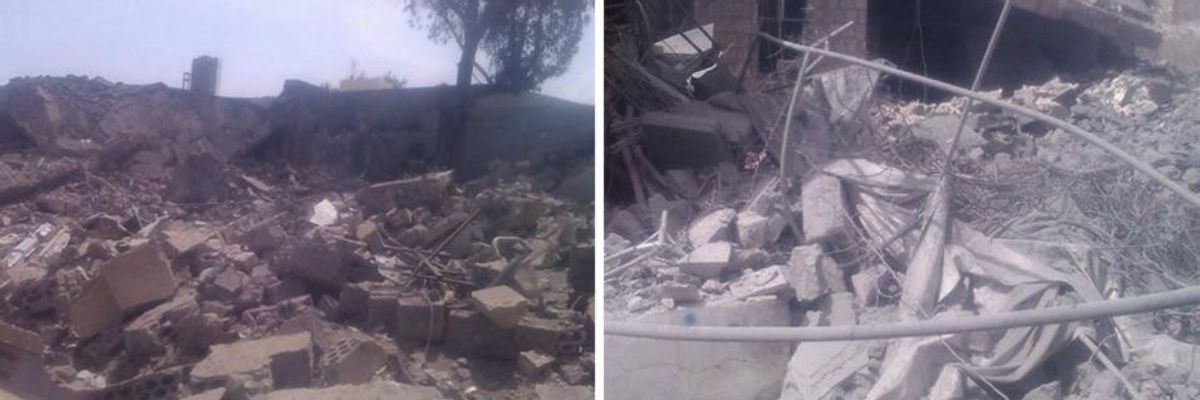Update 5:15 PM Eastern Standard Time:
Doctors Without Borders/Medecins Sans Frontieres confirmed Tuesday afternoon that one of its small hospitals, located in the Haydan district in Saada Province, "was hit by several airstrikes beginning at 10:30 p.m. last night."
"Hospital staff and two patients managed to escape before subsequent airstrikes occurred over a two-hour period," the organization said in a statement. "One staff member was slightly injured while escaping. With the hospital destroyed, at least 200,000 people now have no access to lifesaving medical care."
Hassan Boucenine, MSF head of mission in Yemen, denounced the attack as "another illustration of a complete disregard for civilians in Yemen, where bombings have become a daily routine."
Earlier:
A Doctors Without Borders/Medecins sans Frontieres (MSF) hospital in northern Yemen was bombed Monday night by the Saudi Arabia-led military coalition.
Tim Shenk, press officer for MSF, confirmed to Common Dreams that the active medical facility, based in the Saada governorate, has been hit. The strike was initially reported by the aid agency's Yemen bureau, which noted that there were several patients and staff members in the facility at the time of the attack.
"Our hospital in the Heedan district of Saada governorate was hit several times. Fortunately, the first hit damaged the operations theater while it was empty and the staff were busy with people in the emergency room. They just had time to run off as another missile hit the maternity ward," MSF country director Hassan Boucenine toldReuters.
"It could be a mistake, but the fact of the matter is it's a war crime. There's no reason to target a hospital," Boucenine continued. "We provided (the coalition) with all of our GPS coordinates about two weeks ago."
The bureau also released images of the facility following the bombing:
This is not the first such attack. Since the Saudi-led and U.S.-backed military campaign began over six months ago, the coalition has bombed medical facilities, markets, schools, power plants, refugee camps, factories, and warehouses storing humanitarian supplies. In addition, the Saudi-led naval blockade has left 80 percent of Yemen's population in dire need of food, water, and medical assistance, according to aid agencies.
The World Health Organization estimates that the conflict has so far killed roughly 5,600 people, the majority of them civilian. According to a recent report by Action On Armed Violence and the United Nations Office for the Coordination of Humanitarian Affairs, in 2015, 93 percent of people killed or wounded in populated areas as a result of "air-launched explosive weapons" were civilians.
The Saudi-led coalition is responsible for the vast majority of these killings. The office of the United Nations High Commissioner for Human Rights reported last month that "almost two-thirds of reported civilian deaths had allegedly been caused by coalition airstrikes, which were also responsible for almost two-thirds of damaged or destroyed civilian public buildings."
Monday's bombing comes just over three weeks after the U.S. military bombed a functioning MSF hospital in Kunduz, Afghanistan, killing at least 30 people.
Rupert Colville


